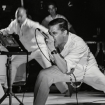On June 8th, 1992, Faith No More dropped the giant WTF bomb known as Angel Dust on an unsuspecting world. The follow-up to 1989's The Real Thing, the genre-busting Bay Area band's platinum-selling breakthrough, the brilliantly warped Angel Dust aggressively defied industry and fan expectations alike by serving up a dark, difficult and occasionally disjointed set of 13 songs (12 originals, plus a cover of John Barry's theme from the 1969 film Midnight Cowboy). None bore the slightest resemblance whatsoever to "Epic," Faith No More's Top 10 hit from 1990 — or to anything available in record stores at the time. "We wanted to make the most [of The Real Thing's success] by putting something interesting out there while we had people's ears," bassist and co-founder Billy Gould explained to The Guardian in July 2015.
It was interesting, all right, though it wound up severely alienating — or going completely over the heads of — many of the folks who initially heard it. "I thought that it was a great record [but] it was dense and probably too clever for its own good," singer Mike Patton told Kerrang! in March 1995. "We made it more difficult for everybody, even ourselves!"
Indeed. Though Angel Dust peaked at No. 10 on the Billboard 200, it moved significantly fewer copies than its platinum-selling predecessor, and received some markedly less-than-enthusiastic reviews, especially from the American press. (Entertainment Weekly called it "probably the most uncommercial follow-up to a hit record ever.") As the years have passed, however, the album has been positively re-evaluated by critics and embraced by FNM fans as a masterpiece, while younger bands like the Deftones, System of a Down and Dillinger Escape Plan have praised the album for (and followed in the footsteps of) its fearless juxtaposition of stylistic and sonic elements. Faith No More's most recent tour, in 2015, saw the band incorporating over half of Angel Dust's songs into their ever-changing set lists, with "Caffeine" and "Midlife Crisis" included nearly every night.
"We just decided that no matter what, we would try to follow our instincts as much as possible, and do what feels right, with the hope that it would make a connection somewhere," Gould told the Faith No More Blog in 2012. "In the beginning, it felt like the gamble didn't work. But now… it's extremely validating to feel like, in the end, we did make the connection and that our original instincts were correct."Here are 10 things you might not know about Angel Dust.
1. Angel Dust was the first Faith No More album where Mike Patton had a hand in the music.
While the success of The Real Thing turned Mike Patton into a star, few people realized at the time that the singer hadn't had any creative input into the album's music. Having parted ways with singer Chuck Mosely following a difficult 1988 tour of Europe, the remaining members of the band — Gould, keyboardist Roddy Bottum, guitarist Jim Martin and drummer Mike Bordin — had written the music for The Real Thing before bringing Mr. Bungle frontman Patton into the fold; Patton then wrote the lyrics for all of the album's songs in two weeks. "The Real Thing had been like someone else's, someone else's band, it had felt like an obligatory thing," the singer told journalist Steffan Chirazi in 1992. But on Angel Dust, Patton was able to stretch his creative wings, contributing music for six of the album's tracks, including "Caffeine," "Midlife Crisis" and "Malpractice."
2. Mike Patton's lyrics for of "Land of Sunshine" combine fortune cookies with questions from a Church of Scientology personality test.
Ever one to take inspiration from unusual sources, Patton literally pulled several of lines for "Land of Sunshine" from fortune cookies. "I bought bags and bags of fortune cookies and took phrases from them," he told Reflex magazine in June 1992. "You are an angel heading for a land of sunshine," read one of them; "Pat yourself on the back and give yourself a handshake," read another. Patton then juxtaposed these positive affirmations with several questions lifted from the Oxford Capacity Analysis test, a personality test of dubious worth that the Church of Scientology has offered to potential converts for decades: "Do you sing or whistle just for fun?" "Do others push you around?" "Does emotional music have quite an effect on you?" The creepy combination made for an appropriately unhinged opening track to the album.
3. "Midlife Crisis" was partly inspired by Madonna.
The first single released from Angel Dust, the ominous and eerie "Midlife Crisis" had the working title of "Madonna" during the album's recording sessions. There was a reason for this, as Patton revealed at the time: "The song is based on a lot of observation and a lot of speculation," he said. "But in sort of a pointed way it's kind of about Madonna ... I think it was a particular time where I was being bombarded with her image on TV and in magazines and her whole schtick kind of speaks to me in that way ... like she's going through some sort of problem. It seems she's getting a bit desperate." Twenty-five years on, it's hard to argue with his assessment.
4. "Midlife Crisis" is the only song in pop music history to sample both Simon and Garfunkel and the Beastie Boys.
Faith No More utilized a number of samples on Angel Dust, something that didn't sit well with guitarist Jim Martin (see No. 9) or their record company Warner Bros., the latter of whom thought that the band's rock-oriented audience might be confused by the use of a production technique that was still primarily associated with hip-hop. But while "Midlife Crisis" employed samples from Simon and Garfunkel's "Cecilia" and the Beastie Boys' "Car Thief," it still sounded unmistakably like Faith No More. Using "Cecilia" to set the song's groove was Roddy Bottum's idea: "It was one of the first songs I heard when I was a kid," the keyboardist revealed in a 2013 Q&A with the Faith No More Blog. "And I think I sampled it 'cause I had a funny relationship with it. The song was kind of built around the rhythm of that sample."
5. "Be Aggressive" is about man-on-man oral sex.
The only song on Angel Dust that Mike Patton had no role in writing, the hard-chugging "Be Aggressive" was penned entirely by keyboardist Roddy Bottum, who wryly juxtaposed a cheerleader chant popular at sporting events with sado-masochistic lyrics about oral sex between men. Though Bottum wouldn't officially come out of the closet until several months after the record was released, his sexual orientation was already known to his bandmates when he presented Patton with the song's lyrics. "It was a pretty fun thing to write," Bottum told The Advocate in 1993, "knowing that Mike was going to have to put himself on the line and go up onstage and sing these vocals." Patton, to his credit, took it like a man.
6. The band covered "Midnight Cowboy" because Billy Gould was obsessed with easy listening music from the 1950s and 60s.
With its wistful melody and stately tempo, the John Barry-penned instrumental "Midnight Cowboy" (originally featured in the soundtrack of the 1969 film of the same name) was an inspired and unexpected choice to close Angel Dust. But while Mike Patton's love of 1960s soundtracks would subsequently inform his work with Mr. Bungle and his 2010 solo album Mondo Cane, the idea to cover "Midnight Cowboy" actually came from Billy Gould. "I went through some strange period where I was listening nonstop to an old San Francisco pop radio station called Magic 61, that played stuff like the Mills Brothers, Gogie Grant, Tony Bennett," he told the Faith No More Blog. "'Midnight Cowboy' was a byproduct of this."
7. The video for "Everything's Ruined" looked cheap, because Warner Bros. couldn't (or wouldn't) give the band enough money to make a better one.
One of the most controversial videos in the Faith No More catalog, the Ken Kerslake-directed clip for "Everything's Ruined" shows the band goofing around in front of a series of absurdly unconnected video projections. Some fans love the clip for the way it highlights the band's sardonic sense of humor, while others find it irritatingly half-assed and cheap-looking — but according to Billy Gould, the cheapness of the clip was partly out of necessity. "Warner's spent the video budget on [the clips for 'Small Victory' and 'Midlife Crisis'], so that when it came time to 'Everything's Ruined' there wasn't much left," he told the Faith No More Blog in 2012. "It was our idea to take this further and make a video as cheap as humanly possible, in one of those video booths like they had at county fairs, where you sing and dance in front of a blue screen. We didn't quite get to do that, but we got it as close as possible."
8. The band has (almost) never played "Smaller and Smaller" live.
While Faith No More have played nearly every song from Angel Dust at least a handful of times in concert — and several of the songs have continued to feature regularly in their set lists — the band has been exceedingly reluctant to play the majestic "Smaller and Smaller" live. According to Setlist.fm, they've only played it once, during their October 14th, 1992 show at Burruss Hall in Blacksburg, Virginia. "For some reason or another, we tend to gravitate towards what is called 'mid-tempo' in our writing … In other words, songs that are not fast, but not exactly ballads either," Billy Gould told the Faith No More Blog in 2012. "This is all great to listen to, but when it comes to playing live, too many mid-tempo songs make the set really boring, for us, and for the crowd … "Smaller and Smaller" while pretty grandiose in concept, always felt too long and too plodding to even consider doing live. And truth be told, we were never quite as attached to that one as some of the others."
9. Angel Dust was the last Faith No More album with guitarist Jim Martin — but not because he didn't like the music.
The most unabashedly metal-oriented member of Faith No More, guitarist Jim Martin seemed like the odd man out on Angel Dust; he only received writing credits on two of the album's songs — "Kindergarten" and "Jizzlobber" — and there was far less overtly-metallic guitar featured across the record. So when Martin began to visibly lose interest in the band, many believed it was because he was unhappy with the album's musical direction. But according to an interview that the semi-reclusive Martin gave to a Faith No More fan site in 2012, his discontent had less to do with the album's music than with the stressful vibe of the recording sessions.
"I wanted more of the record to happen in the studio and Bill wanted every last tack nailed down before we went in," he explained. "I wanted to spend time with it, management and the record company wanted to rush it out the door. There were a bunch of journalists in the studio. We were paying for a bunch of sampling that we could have created. [Co-producer] Matt Wallace was calling me on the phone complaining about Mike Patton's performance. Management and record company were calling me complaining about Mike Patton's performance and desire for outside projects … The pressure was on, and everyone wanted to be in the studio with me while I recorded, endlessly tinkering and fucking with me and fucking with Matt, and Matt is a really fucking wound-up guy already." Martin's unresolved resentments over the recording sessions (and various band business decisions) would continue to fester, eventually resulting in his firing in the fall of 1993.
10. Angel Dust sold much better in other countries than it did in the U.S.
Less than three months after its release, Angel Dust achieved gold status — selling 500,000 copies — in the U.S., but sales quickly dropped off thereafter, and the album was widely considered a commercial disappointment compared to The Real Thing. In Britain, however, Angel Dust actually outsold The Real Thing (thanks in part to the presence of "Easy," a cover of the 1977 Commodores hit, which wasn't included on the album's original American release), and the record has gone on to sell roughly three-million copies overseas, compared to less than a million in U.S. Not that Faith No More have ever been about album sales …
"You can look back and rack up your gold records on the wall and it doesn't mean a fucking thing if you know that at some point you had to pretend to be someone you weren't," Billy Gould told Metal Hammer in 2015. "Faith No More, for all the huge crowds we played to, for all the albums we sold, for all the acclaim we got — we really didn't behave like or believe in the same things that a rock band was supposed to. I don't recall money or 'business' shit ever getting talked about. I don't recall arguments about anything but the music and that was just the way we made music. To be able to keep that focus, to see through the shit and try and gain your immortality through music — that's something that I think we stuck to and never lost sight of. I'm totally proud of that, totally proud that I was part of something that never compromised and never took the easy way."












